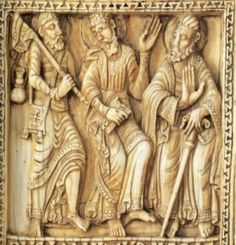Thoughts on Today’s Lessons for Sunday, May 4, 2014

The Journey to Emmaus. Ivory plaque from a reliquary, Léon, ca.1115-20. The Metropolitan Museum of Art, New York.
These verses call for careful reading, as they stem from a time of tension between Judaism and early Christians who were hurt and angry over being expelled from the synagogues for their belief in Jesus as Messiah. But hearing Peter blame “the entire house of Israel” for Jesus’ crucifixion could lead Christians down the hate-filled path of anti-Judaism. It’s better to hear this reading as God’s gracious promise that the gift of the Holy Spirit is open to everyone.
Psalm: Psalm 116:1-3, 10-17
This Psalm of thanksgiving is understood as a hymn of gratitude for recovery from illness. It is vivid in its description of the anguish of illness and the fear of death, but also of the transforming joy that comes with recovery. We hear a theme of resurrection here, too, the joy that comes with escaping the darkness of the underworld to win the bounty of salvation. In the joy of restored life, we thank God for loosing us from the snares of death.
Second Reading: 1 Peter 1:17-23
In another brief glimpse at the first letter written in Peter’s name by a later follower, we again see the early church trying to work out what Jesus’ death and resurrection means in our lives. This search for understanding would go on for centuries and arguably continues today, but the basics stand through the millennia: Through Christ we trust in God; through Christ we love one another, and through Christ we gain life in the enduring word of God.
Gospel: Luke 24:13-35
What a confusing time the first Easter must have been for those who loved Jesus! Today’s Gospel, like last Sunday’s reading about Jesus entering the locked room where the disciples were hiding, suggests that they remained uncertain, uneasy, even scared. “We had hoped that he was the one to redeem Israel,” two of them told the stranger on the road to Emmaus, their phraseology suggesting that this hope, once alive, now was gone. Nor does it seem that they believed the women, any more than Thomas had believed the others, until they saw for themselves. But the traveler, Jesus, revealed himself in the breaking of the bread, just as we discover Jesus when we gather at the Eucharistic table today.
